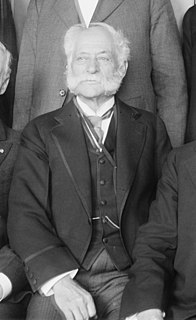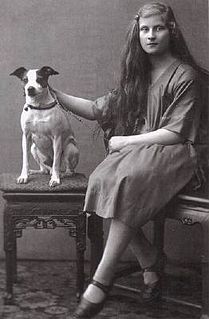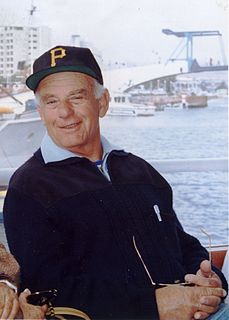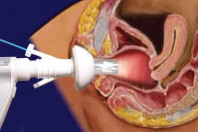
Henry John Heinz was a German-American entrepreneur who founded the H. J. Heinz Company based in Pittsburgh, Pennsylvania. He was born in that city, the son of German immigrants from the Palatinate who came independently to the United States in the early 1840s. Heinz developed his business into a national company which made more than 60 food products; one of its first was tomato ketchup. He was influential for introducing high sanitary standards for food manufacturing. He also exercised a paternal relationship with his workers, providing health benefits, recreation facilities, and cultural amenities. His descendants carried on the business until fairly recently, selling their remaining holdings to the predecessor company of what is now Kraft Heinz. Heinz was the great-grandfather of former U.S. Senator H. John Heinz III of Pennsylvania.

The H. J. Heinz Company, better known as Heinz, is an American food processing company based in Pittsburgh, Pennsylvania. Originally, the company was founded by Henry John Heinz in 1869. Heinz manufactures thousands of food products in plants on six continents, and markets these products in more than 200 countries and territories. The company claims to have 150 number-one or number-two brands worldwide. Heinz ranked first in ketchup in the US with a market share in excess of 50%; the Ore-Ida label held 46% of the frozen potato sector in 2003.

Henry John Heinz III was an American businessman and politician from Pennsylvania. A Republican, Heinz served in the United States House of Representatives from 1971 to 1977, and in the United States Senate from 1977 until he was killed in a plane crash in Lower Merion Township, Pennsylvania, in 1991.

Heinz Field is a stadium located in the North Shore neighborhood of Pittsburgh, Pennsylvania, United States. It primarily serves as the home to the Pittsburgh Steelers of the National Football League (NFL) and the Pittsburgh Panthers of the National Collegiate Athletic Association (NCAA). The stadium opened in 2001, after the controlled implosion of the teams' previous stadium, Three Rivers Stadium. The stadium is named for the locally based H. J. Heinz Company, which purchased the naming rights in 2001. It hosted the 2011 NHL Winter Classic between the Pittsburgh Penguins and Washington Capitals on January 1, 2011. On September 10, 2016, it hosted the Keystone Classic, which featured a renewal of the Penn State-Pitt football rivalry, setting a new attendance record at 69,983 people. In 2017 it hosted the Coors Light Stadium Series game featuring the Pittsburgh Penguins and Philadelphia Flyers.

Roger Huntington Sessions was an American composer, teacher, and writer on music.
Henry John Heinz II was an American business executive and CEO of the H. J. Heinz Company based in Pittsburgh, Pennsylvania, USA. His grandfather Henry J. Heinz founded the company in the nineteenth century, and he worked in a variety of positions within the company before becoming CEO.

Dark Assault is the third studio album by the German power metal band Iron Savior. It continues the science fiction story that the band introduced on their debut album Iron Savior and continued on Unification and the Interlude EP. It is the first album to feature guitarist Joachim Küstner and the last to feature Kai Hansen before committing himself back to his band Gamma Ray.
Victor von Richter was a German chemist and discovered the von Richter reaction.

Princess Elisabeth Maria of Bavaria was a German princess of the House of Wittelsbach. She was the daughter of Prince Alfons of Bavaria and his wife Louise Victoire.
The Symphony No. 2 of Roger Sessions was begun in 1944 and completed in 1946.
The Prausnitz–Küstner test is an immunologic test formerly used by physicians to determine if a patient has an allergic reaction to a specific antigen. The test has been replaced by the safer skin prick test. The PK test involves transferring serum from the test subject to another healthy person, essentially using the second person as a mixing vessel for antibodies and antigen. This is a pathway for transmission of blood-borne ailments like Creutzfeldt–Jakob disease, AIDS, and others, which is why the test is no longer recommended. Or in simple words, a test for the presence of immediate hypersensitivity in humans; test serum from an atopic individual is injected intradermally into a normal subject; the normal subject is challenged 24–48 hours later with the antigen suspected of causing the immediate hypersensitivity reaction in the atopic individual.

The Arado Ar 77 was a German twin-engined monoplane, designed as an advanced training aircraft from 1934.

The Albatros L102 / Albatros Al 102, was a German trainer aircraft of the 1930s. It was a parasol-wing landplane, seating the student pilot and instructor in separate, open cockpits. A biplane floatplane version was also built as the Al 102W, with strut-braced lower wings.
The Albatros L 103 / Albatros Al 103 was a German experimental aircraft of the 1930s. It was a parasol-wing landplane of conventional configuration, seating the pilot and flight test observer in separate, open cockpits. The Al 103 was used to test variations in sweepback, dihedral and tailplane area.

The 1988 United States Senate election in Pennsylvania was held on November 8, 1988. Incumbent Republican U.S. Senator H. John Heinz III successfully sought re-election to another term, defeating Democratic nominee Joe Vignola.

Moshe (Max) W. Prausnitz was an Israeli archaeologist who specialized in the prehistory field.
The E. V. Murphree Award is an annual award presented by the American Chemical Society for outstanding research of a theoretical or experimental nature in the fields of industrial chemistry or chemical engineering. The award comes with a $5000 prize, a certificate, and up to $1000 in travel expenses paid.
The Kraft Heinz Company is an American food company formed by the merger of Kraft Foods and Heinz based in Chicago, Illinois and Pittsburgh, Pennsylvania. Kraft Heinz is the third-largest food and beverage company in North America and the fifth-largest in the world with $26.2 billion in annual sales as of 2017. It is responsible for over 25 brands including Kraft, Heinz, Planters, Grey Poupon, Oscar Mayer and more, of which eight have total individual sales of over $1 billion.










